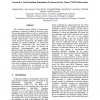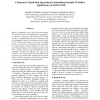123
Voted
ESCIENCE
2007
IEEE
15 years 8 months ago
2007
IEEE
One of the objectives of e-Research is to help scientists to accomplish their research, including scientific experiments, more effectively and efficiently. Web services provide ...
109
Voted
ESCIENCE
2007
IEEE
15 years 8 months ago
2007
IEEE
The electronics design industry is facing major challenges as transistors continue to decrease in size. The next generation of devices will be so small that the position of indivi...
124
Voted
ESCIENCE
2007
IEEE
15 years 8 months ago
2007
IEEE
This paper presents GMLE 1 , a generic and distributed framework for maximum likelihood evaluation. GMLE is currently being applied to astroinformatics for determining the shape o...
105
click to vote
ESCIENCE
2007
IEEE
15 years 8 months ago
2007
IEEE
Future Grid Networks should be able to provide Quality of Service (QoS) guarantees to their users. In this work we propose a framework for Grid Networks that provides deterministi...
84
Voted
ESCIENCE
2007
IEEE
15 years 8 months ago
2007
IEEE
124
Voted
ESCIENCE
2007
IEEE
15 years 8 months ago
2007
IEEE
As scientific workflows and the data they operate on, grow in size and complexity, the task of defining how those workflows should execute (which resources to use, where the resou...
102
click to vote
ESCIENCE
2007
IEEE
15 years 8 months ago
2007
IEEE
Structural biology research places significant demands upon computing and informatics infrastructure. Protein production, crystallization and X-ray data collection require solutio...
110
click to vote
ESCIENCE
2007
IEEE
15 years 8 months ago
2007
IEEE
Service-Oriented Architectures provide integration of interoperability for independent and loosely coupled services. Web services and the associated new standards such as WSRF are...
ESCIENCE
2007
IEEE
15 years 8 months ago
2007
IEEE
Since the birth of computational and data grids, many middlewares have been developed and deployed. Currently, they are used in a multitude of isolated e-Infrastructures and a hot...
108
click to vote
ESCIENCE
2007
IEEE
15 years 8 months ago
2007
IEEE
Effective scheduling is a key concern for the execution of performance driven Grid applications. In this paper, we propose a Dynamic Critical Path (DCP) based workflow scheduling ...





